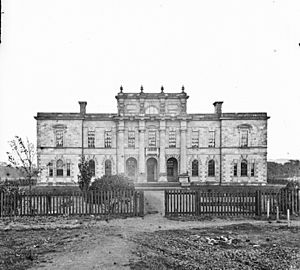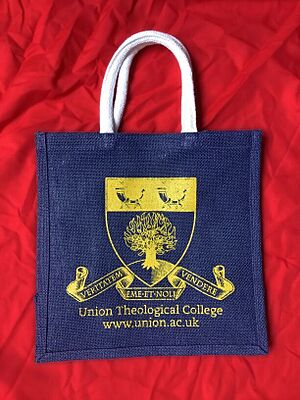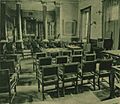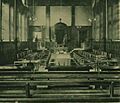Union Theological College facts for kids
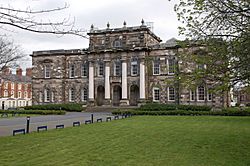 |
|
| Motto | Latin: "Veritatem eme et noli vendere" |
|---|---|
|
Motto in English
|
"Buy the truth and sell it not" (taken from Proverbs 23:23) |
| Established | 1853 (Assembly's College) |
|
Academic affiliation
|
Queen's University Belfast (1926-2021) St Mary's University, Twickenham(1921- ) |
| Principal | Michael McClenahan |
| Address |
108 Botanic Avenue
,
,
Belfast BT7 1JT |
| Affiliations | Presbyterian Church in Ireland |
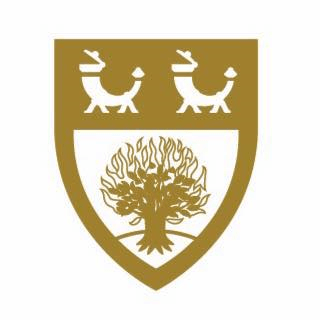 |
|
Union Theological College is a special college in Belfast, Northern Ireland. It trains people to become ministers and leaders for the Presbyterian Church in Ireland. The college also offers courses for anyone interested in learning more about theology, which is the study of religious faith and practice. Some courses can even be taken online!
The college's professors form the Presbyterian Theological Faculty of Ireland (PTFI). This group has a special permission, called a Royal Charter, to give out advanced university degrees.
- Students can earn their first university degrees through St Mary's University, Twickenham.
- Advanced studies are offered with a partner called BibleMesh.
- Doctoral studies are supervised with the Kirby Laing Centre for Public Theology and Davenant Hall.
Most ministers and deaconesses (women who serve the church) for the Presbyterian Church in Ireland train at this college. However, the church also accepts training from other approved colleges.
Contents
History of the College
Starting as Assembly's College
The college first opened in 1853 as the Assembly's College. Its beautiful building was designed by Sir Charles Lanyon. He also designed the main building at Queen's University. The college was built using stone from Scrabo and cost about £5,000.
Many students joined after a big religious revival in 1859. Because of this, a new south wing was added in 1869. This part included a dining hall and rooms for students. Later, in 1881, a north wing with a wood-paneled chapel was completed.
The college started giving out degrees in 1883. From 1921 to 1932, the new Parliament of Northern Ireland actually met in the college! This was while their main building, Stormont, was being built. The Commons met in the college library, and the Senate met in the chapel.
In 1926, the college became connected with Queen's University Belfast. However, some people criticized the college for its new ideas about theology. This led to a famous trial in 1927 involving Professor James E. Davey. He was accused of teaching things that went against the church's beliefs.
Even though Professor Davey was found innocent, some Presbyterians left the church. They later started a new church called the Evangelical Presbyterian Church.
The college officially reopened in October 1932. From 1941 to 1948, the city police used the college as their headquarters. Their own building had been bombed during the Belfast Blitz. In 1953, Professor Davey was chosen as the Moderator (leader) of the General Assembly to celebrate the college's 100th anniversary.
Becoming Union Theological College
In 1976, another college, Magee College in Derry, stopped its theology teaching. In 1978, these two colleges joined together. The new college was named the Union Theological College. This was made official by a special law passed by Parliament.
In 2003, the college celebrated its 150th birthday. They completed a big renovation that cost £2.8 million. This added modern study bedrooms with bathrooms for students.
On November 14, 2009, a fire caused serious damage to the back of the college. This happened during another renovation project. A new extension, called the Training Resource Centre, opened in September 2011. It provides more rooms for lectures and seminars. From 2013 to 2017, a major project was done to restore the college's stonework.
In 2017, the college celebrated the 500th anniversary of the Reformation. They held a conference and a series of seminars about this important historical event. The college also updated its official crest and logo in 2018 and again in 2022.
Changes with Queen's University Belfast
In 2016, Queen's University Belfast looked closely at how theology was being taught. They noticed that fewer students were studying theology overall. They also had some concerns about how diverse the teaching staff was. However, they praised the college for its "excellent student satisfaction rates" and its caring environment for students.
In 2019, Queen's University decided to stop offering theology degrees. This meant ending its connection with all four theological colleges, including Union Theological College. This change meant the college needed to find new ways to fund its programs.
Until 2021, the college had worked with Queen's University for its degrees. After the change, the college looked for new partners.
New Partnerships for the Future
After its link with Queen's University ended, Union Theological College formed new partnerships. In 2020, the college announced it would work with St Mary's University, Twickenham. This is a Roman Catholic university. This partnership allows Union Theological College to continue offering undergraduate degrees.
The Presbyterian Church explained that this is a "validation arrangement." This means Union College keeps its own identity and beliefs, and St Mary's respects that. Both colleges share Christian values. This partnership is seen as a positive step for Northern Ireland, showing that old divisions can be overcome.
The Presbyterian Theological Faculty of Ireland has had a Royal Charter since 1881 to give out advanced degrees. This charter was updated in 2021 to make it more modern.
In 2022, the college announced it would work with the Kirby Laing Centre for Public Theology in Cambridge. This partnership helps the college supervise students working on their PhD degrees.
Another partnership was announced in 2023 with Davenant Hall. Students from Davenant Hall's Master of Letters program can now continue their studies at Union Theological College to earn a PhD. Several teachers from Davenant Hall have also joined the faculty at Union Theological College to help supervise these advanced studies.
College Staff
The college has a team of professors and lecturers. They lead different academic areas and teach students. Professor W. Gordon Campbell became the principal (head) of the college in 2021.
Well-Known Staff Members
- Dr Martyn C. Cowan (Lecturer in Historical Theology)
Past Staff Members
- Prof. Henry Cooke (died 1868)
- Prof. Robert Watts (died 1895)
- Prof. J. Ernest Davey (died 1960)
- Prof. Finlay Holmes (died 2008)
- Prof. Laurence Kirkpatrick (Professor of Church History and former Principal)
- Prof. Stephen N. Williams (Professor Emeritus of Systematic Theology)
- Principal J. Stafford Carson (former Principal and Professor of Ministry)
The College Library
The college has the largest theological library in Northern Ireland. It was started in 1873 by Mrs. Caroline Gamble. The library has over 65,000 books, 20,000 pamphlets, and receives more than 50 journals.
The library's domed room was even used as the meeting place for the House of Commons of the Northern Ireland Parliament from 1921 to 1932. The library's collection actually started even before the college, in 1845. Many books and papers were added from the collection of a historian named Rev. James Seaton Reid.
Images for kids
See also
- Category:Academics of Union Theological College, Belfast
 | Bessie Coleman |
 | Spann Watson |
 | Jill E. Brown |
 | Sherman W. White |


